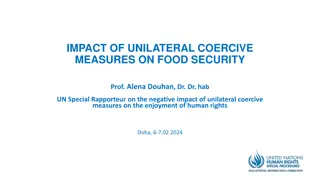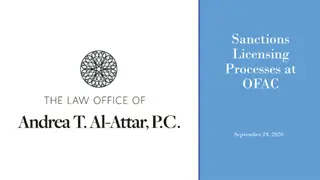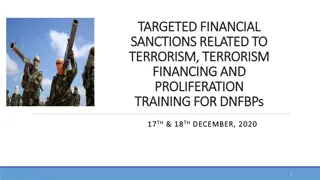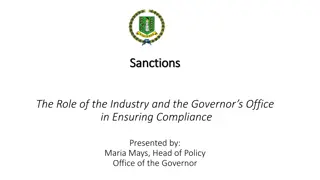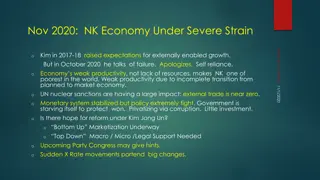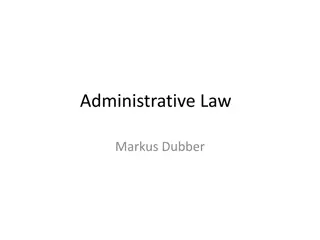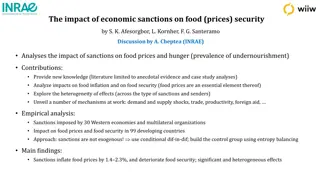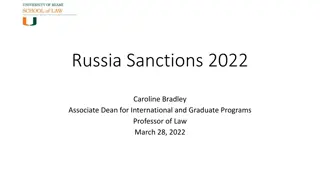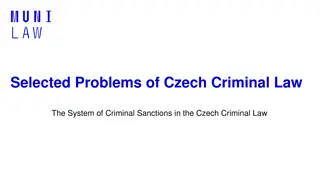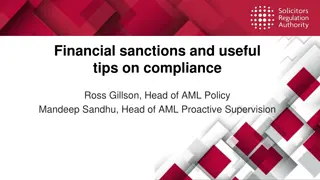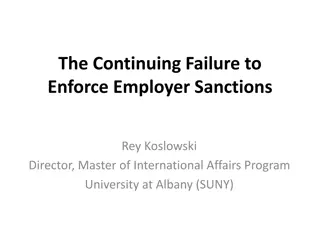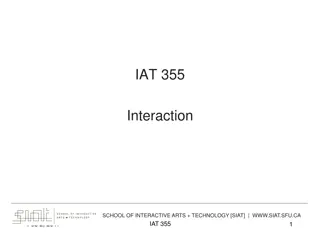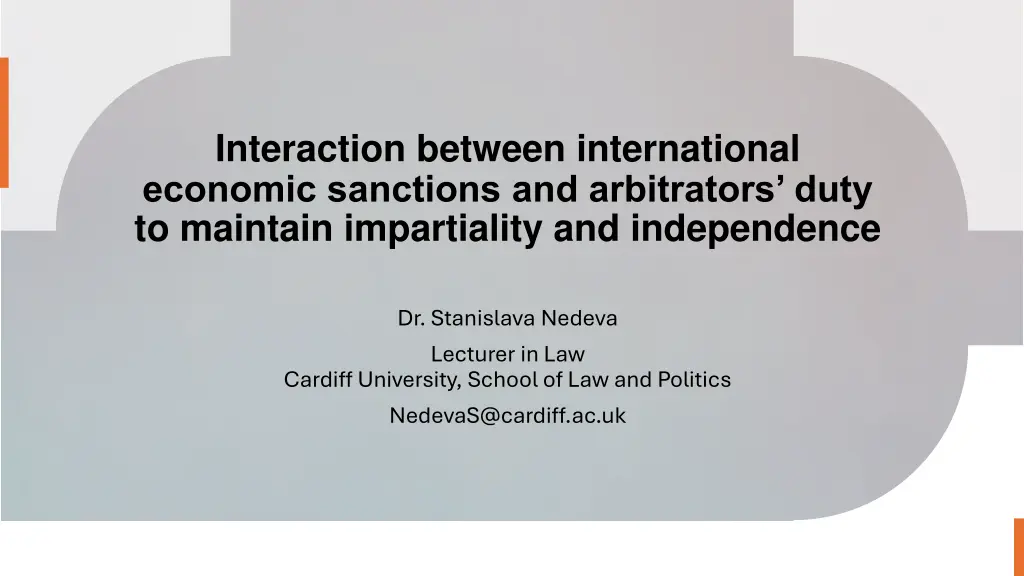
Interaction Between International Economic Sanctions and Arbitrators' Duty
Explore the impact of international economic sanctions on arbitrators' impartiality and independence, examining perspectives from the EU and sanctioned parties like Russia. Understand the challenges and implications of maintaining neutrality in arbitration proceedings amid complex geopolitical dynamics.
Download Presentation

Please find below an Image/Link to download the presentation.
The content on the website is provided AS IS for your information and personal use only. It may not be sold, licensed, or shared on other websites without obtaining consent from the author. If you encounter any issues during the download, it is possible that the publisher has removed the file from their server.
You are allowed to download the files provided on this website for personal or commercial use, subject to the condition that they are used lawfully. All files are the property of their respective owners.
The content on the website is provided AS IS for your information and personal use only. It may not be sold, licensed, or shared on other websites without obtaining consent from the author.
E N D
Presentation Transcript
Interaction between international economic sanctions and arbitrators duty to maintain impartiality and independence Dr. Stanislava Nedeva Lecturer in Law Cardiff University, School of Law and Politics NedevaS@cardiff.ac.uk
Outline 1. a. b. 2. Perspectives on economic sanctions a. EU perspectives in the context of sanctions against Russia b. Perspectives of sanctioned parties: Russia 3. Impact of economic sanctions 4.Conclusion Defining the Concepts Impartiality and Independence Economic Sanctions
Defining economic sanctions Restrictive limitations imposed on states, state entities, indvs., govts., targeted industries; by individual states or int l orgs. (e.g., UN and EU). E.g., trade embargoes, import and export restrictions, asset freeze, travel and visa restrictions, financial restrictions
Perspectives on economic sanctions a. EU perspectives in the context of sanctions against Russia a. EU perspectives in the context of sanctions against Russia EU-based arbitral institutions issued a joint statement re impact on IA All arbitral institutions based in EU states, including SCC, LCIA and ICC, are subject to EU law. They are required to observe EU sanctions regulations, which often complement, or are intended to operate in tandem with, US (and UN) sanctions. These sanctions do not result in a substantial change in the administration of arbitral proceedings. Arbitral proceedings involving EU sanctions are subject to internal compliance mechanisms specific to arbitral institutions. Emphasis on unaffected impartiality; neutrality is guaranteed very much business as usual with extra administrative compliance checks
Perspectives on economic sanctions b. Perspectives of sanctioned parties: Russia b. Perspectives of sanctioned parties: Russia Perception of neutrality JSC Uraltransmashv PESA Mere imposition of sanctions creates a perception of compromised access to justice (e.g.,fair, equitable and impartial arbitral proceedings) Russian Arbitrazh Procedure Code 2020: exclusive jurisdiction involving Russian and foreign parties subject to sanctions; anti-arbitration injunctions could be filed Moscow Arbitration Court refused to move litigation with a sanctioned Russian state-owned body to the LCIA (2023) Move towards sanctions-neutral countries? Looking East towards SIAC and HKIAC? But! In June 2023, the Arbitrazh Court of St. Petersburg refused to suspend litigation proceedings over arbitral proceedings at HKIAC. So, risk that even arb.insts. in non-sanctioning countries are not sanctions-neutral? -> limited pool of arbitrators and arbitral foras-> limiting access to justice
Impact of sanctions Political tension and influences over dispute resolution Threat of assumption of jurisdiction over dispute, seek to circumvent/disregard arbitration clauses, or refuse the recognition and enforcement of foreign awards No objective evidence to suggest arbitrators impartiality is compromised But still, sanctioned parties may feel less secure with arbitrators whose nationality/physical abode is in sanctioning country E.g. cases such as Bernhard von Pezold and Others v Zimbabwe: allegation that President of tribunal was not impartial as also Chair of the World Bank Sanctions Board Caratube v Kazakhstan: repeat appointments and involvement in cases against closely related parties Strong public opinions: risk of prejudgment
Impact of sanctions a. b. Hearing witnesses c. Payment of administrative fees or arbitration costs Representation of sanctioned parties Operation of law and rule of law d. Refusal to hear cases submitted by sanctioned parties (Art 24A.10 LCIA Rules) (access to justice) International arbitration e. AT need to ensure compliance with sanctioning regimes (as may be found in the governing law) and prevent setting aside of award f. Tribunal appointments g. Recognition and enforcement of awards h. Effective remedy
Conclusions Parties perception of neutrality is a leading factor Neutrality is pivotal for the market competitiveness of arbitral institutions Continued need to reiterate impartiality Development of due diligence processes and compliance checks Issue remains political in nature Future challenges are likely: e.g., arbitrator involved in the workings of a sanctioning body; evidence that arbitrator tends to decide cases against the same (sanctioned) party; strong public opinions (Sanctioned) states and domestic courts to influence domestic dispute resolution
Thank you for your attention! Dr. Stanislava Nedeva, Lecturer in Law School of Law and Politics Cardiff University NedevaS@cardiff.ac.uk https://www.linkedin.com/in/stanislava-nedeva-20391398/

